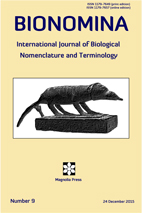Abstract
The International Code of Zoological Nomenclature provides tools that assure universality and unambiguous use of nomina (i.e., the names of animal taxa). The Code gives also high importance to stability of nomina. Nonetheless, the bulk of changes affecting stability of animal nomina results from the ever evolving knowledge of animals and of the taxonomic concepts. While the Code regulates availability of taxonomic works and acts, its effects on stability of nomina are quite limited in the practice. The Code promotes stability of the nomina mainly by requiring departure from the Principle of Priority under certain conditions. The respective dispositions of the Code lack, however, clear definitions, and may have counterproductive side effects. The current practice suggests needs of more simple and straightforward rules. The departure from the Principle of Priority may be useful when stability of nomina of taxa well known also outside the community of biologists is threatened. A reinforced Principle of Priority is claimed for other cases.

